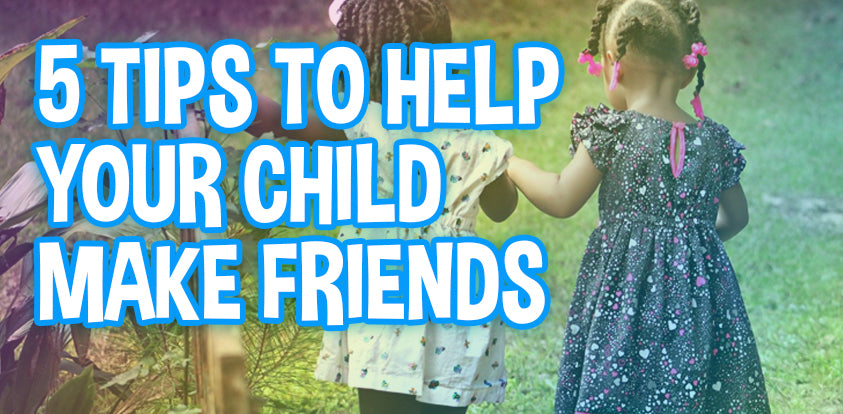
5 Tips To Help Your Child Make Friends... And Keep Them!
Share

Friendships are so important to children of any size. They are the first relationships that will step beyond the control of their parents. It can be terrifying, but it's absolutely necessary. Obviously you can't go out on the street and make friends on behalf of your little ones. "Wanna come to my house to play with my kids?" that comes across as just plain creepy...
What you can do is foster social and emotional intelligence in your children that will allow your child to make friends and keep them. Our little angels are notoriously fickle and this is because they lack a lot of the negotiation skills we learn as we age. Children often think that a small tiff means the friendship is over and without the ability to talk it through it most likely will be.

Role Modeling
The first step toward a sociable and happy kiddo is to take a long hard look in the mirror. Your children will mimic what they see. You need to set the example and explain things. If my friend and I have a falling out, I'll often explain the need to set things right and how to go about that. There are also times that a friendship isn't worth salvaging, and I'll happily explain that too in terms they can grasp.
The other half of being a good role model is to allow your child some freedom. Set up play dates or extracurricular activities. Play dates don't even need to cost much cash, these 5 low-budget playtime ideas are sure to make you the coolest parent on the block! These simple things can really strengthen the bonds of friendship but they can't happen unless you get on board. This also allows you to be an active participant in the process and lightly vet any potential friends that your child might choose.

Obey The Stop Signs
I say this with all the love in the world but kids can be really annoying. They'll tell a joke or pull a prank hoping to get a response and if they don't get it they'll be inclined to repeat it. Teach your child the stop signs. Children don't innately understand that a kid rolling their eyes means "I'm so not into this" so you'll need to teach them some of the signs that mean they should either change tactics or just sit on their hands.
Sometimes the signs are extremely obvious. My kids hear "no" and "stop" so often at home that I'm pretty sure they think it's their middle name, so when it's said by a stranger it might not always have the intended effect. Impress upon your children the importance of "no means no" and I can guarantee that your child will make friends more easily and keep them for much longer than they would otherwise.
Understanding What Isn't Said
This third step is simply taking the unspoken cues from the stop-sign step a bit further. Kids will often feel shy or self-critical and focus inward, which isn't conducive to building a relationship with another person. They'll need to focus on that other person in order to build a friendship. It is hard, but it gets easier with practice.
Have your children make direct eye contact when they're speaking to you. This is such a simple trick that is worth its weight in gold. Both children and adults will feel like your kid is truly listening to what they're saying. In reality he's probably counting Pokemon in his head, but in the end what matters when it comes to making friends is how it makes the other person feel.
That other person can quickly become uncomfortable if the party they're speaking to isn't smelling decent. Nip the problem in the bud with our grape scented shoe deodorizer powder or grape scented foot deodorizer spray!

Subtlety Goes A Long Way
There's an old-school way of thinking that states the number of friends a child has is based on charisma. This has been proven untrue because a friendship can only exist between two equals. Don't raise a boastful child that lists all the myriad reasons that people should be his friend, subtlety goes much further.
What I mean by that is, going up to a group of peers and loudly proclaiming "Can I play with you guys??" is generally destined for failure. Instead teach your child to wait and seize the moment. If a basketball or really any sports team loses, encourage them to walk up and join the losing team. If they manage to win the next game your child will share the glory and if they don't, well, that's a valuable bonding experience as well.

Forwardness and Forgiveness
Alright, so this is a twofer because I like multiples of 5 when it comes to lists but they do kind of fit together! Forwardness is a skill that children don't seem to lack, but you might be surprised. They'll put up with a whole lot from their peers and this can begin to build resentment. Assure your child that it's OK to speak up if their friend is doing something that they don't like.
The other half, forgiveness, has to do with moving past whatever problem occurred between your child and their friend. Forgiveness is a skill that only grows in value as your children age. If forgiveness isn't a very easy option, this is where negotiation comes into play. "I'll be your friend again if you stop doing A and B".
Final Thoughts
Our children are perfectly capable of making tons of friends and keeping them around. I'd argue that they're even more adept at it than most adults, myself included! I can't remember the last time I've gone out to make a new friend. It's possible for adults but for children it's an absolute breeze, particularly when they are given the right social and emotional tools.
